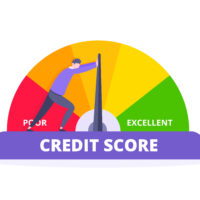How Credit Scoring Models Work

Breaking down the credit scoring models algorithm
Most consumers think they have some idea how scoring models work and believe that they have a certain fixed score at any point in time. The truth is that there are dozens of different scoring models and the big three (Experian, Trans Union and Equifax) all use different ones with different point ranges. If you are looking for a new mortgage or refinance, the lender can order its own particular model and have an intermediary calculate and deliver the scores as they have requested. The exact algorithms that factor or create these different scores are proprietary and closely guarded, but there are some general parameters that are publicly available. The most important element or factor is your payment history (generally 35% of the score) which is significantly impacted by any negative event like charge-off, collections, late payments and settlements for less than full balance due. Next is what sort of debt you are carrying and how much credit you still have available (30% of score). If you have only one or two credit cards and they are maxed out that will significantly depress your score. The length or your oldest account and average account age contributes 15%. Account diversity (10%) takes into consideration whether you have a mortgage, auto loan and revolving debt like credit cards and the mix of that debt. The last portion (10%) considers new credit applications or hard inquiries.
The most important factors to credit scoring
Many consumers become obsessed with hard inquiries and think they have a significant impact on the final score, but that is not necessarily the case. If you apply for an auto loan and the dealership shops your credit all over town and you now have 10 or more new inquiries, fear not. The scoring models take that into consideration, and they know you are not looking for ten different auto loans. The same is true if you apply multiple places for a home equity line or mortgage. However, if you are applying for multiple credit cards at the same time, that will negatively impact your score. The two things that consumers can control are the two most important and the ones that need regular attention: payment history and debt-to-income ratios.
Late payments are the most damaging
By far the most impactful element in a credit score is the payment history and it is somewhat unfair in the way that it impacts different scores or people in different tiers. If you have something derogatory like a 30 or 60-day late payment that will have two different impacts depending on how old it is and how high your credit score is. The older it is like a year or more, the lesser the impact and conversely the more recent it is the greater the impact. If you have a credit score in the 800’s just one 30-day late can have double the downward impact on your score than someone with a 680. Whatever you do, do not pay your mortgage 30 days late. If you are 30-days late on your mortgage, not only will that significantly decrease your score, but you will not be approved for a new mortgage or refinance for the next 12-24 months.
Credit availability is probably the area that consumers can impact the most, by making good decisions. You want to keep your credit card debt at any time less than 10% of your available credit, if possible. Let’s say you have 4 credit cards with a total credit limit of $10,000 and you maintain a monthly average of $1,000 in credit card debt. Compare that to just one card with a limit of $1,000 and an average balance of $1,000. The difference will be huge depending on your existing credit score. However, if you are contemplating a new purchase in the near future like a home or car, you should not be shopping for and opening credit cards to reduce your percentage. Wait to do that when you are not expecting any big loans for a while.
While there are some detailed things that you can do to maximize your credit score beyond the introductory suggestions here, one of the most critical things you can do is check your credit periodically and make sure that someone is not reporting inaccurate things related to your accounts. If there are accounts on your file (and particularly derogatory ones) that are not yours, then you will likely need help correcting them. Blankingship and Christiano, P.C. is dedicated to assisting consumers correct inaccurate credit file data and holding the credit reporting agencies and creditors financially liable for the damage they cause by failing to correct them.
Contact Blankingship & Christiano P.C. to Speak with a Credit Report Error Lawyer
If you have an error on your credit report and need legal help getting it corrected contact the Virginia Credit report error lawyers at Blankingship & Christiano, P.C. (571) 307-6419 or fill out our contact form to discuss your case.

